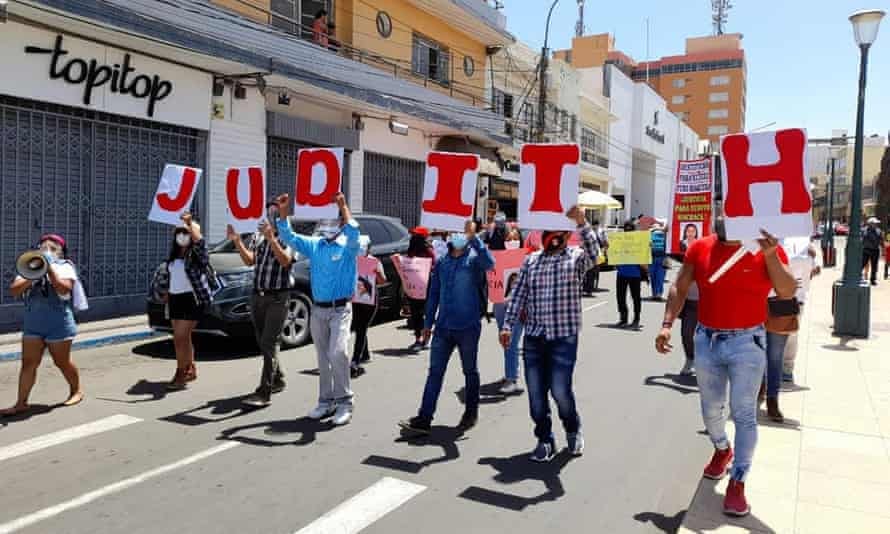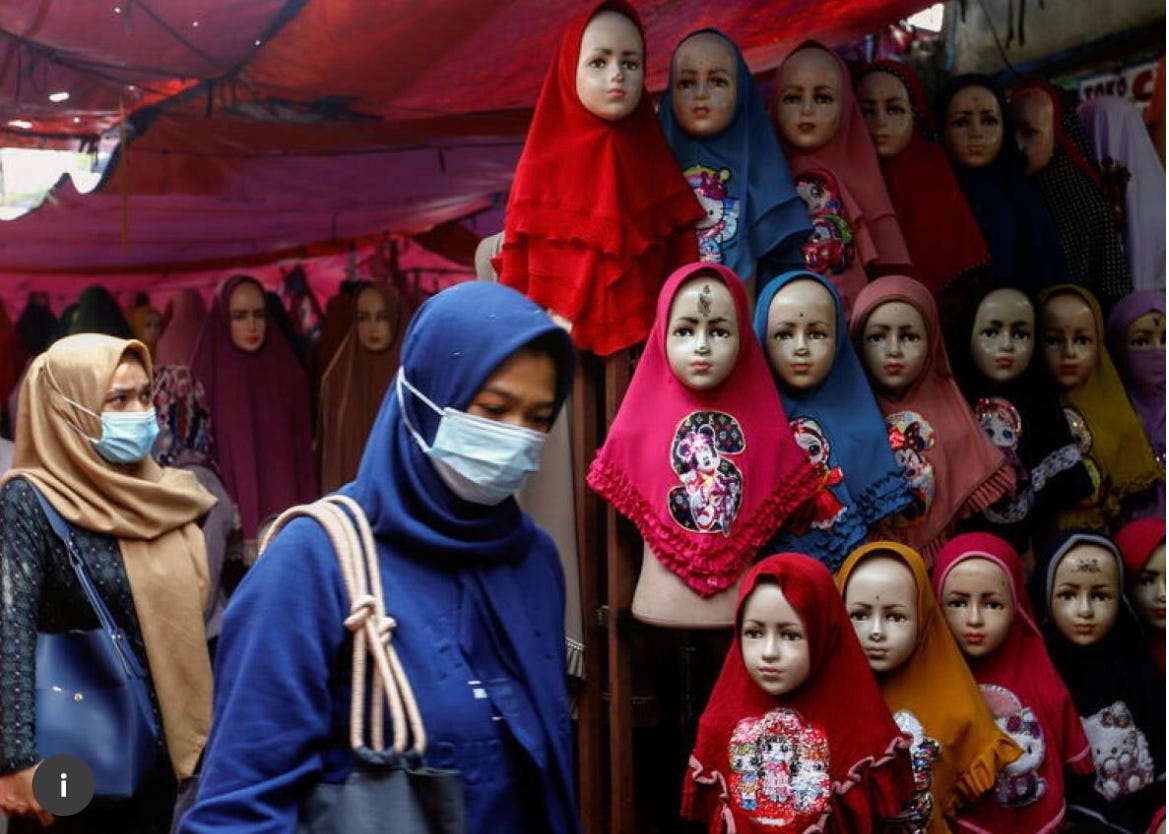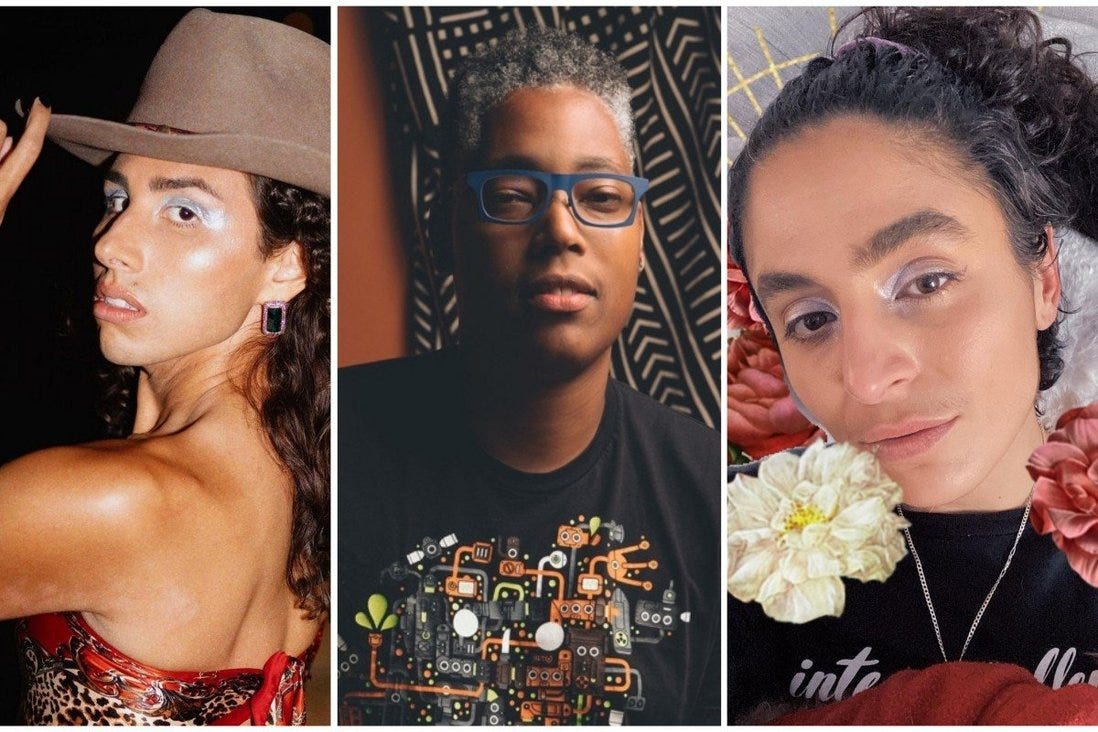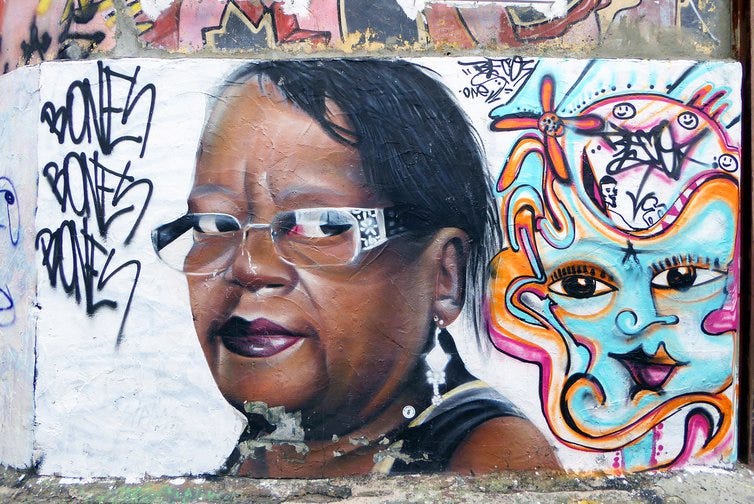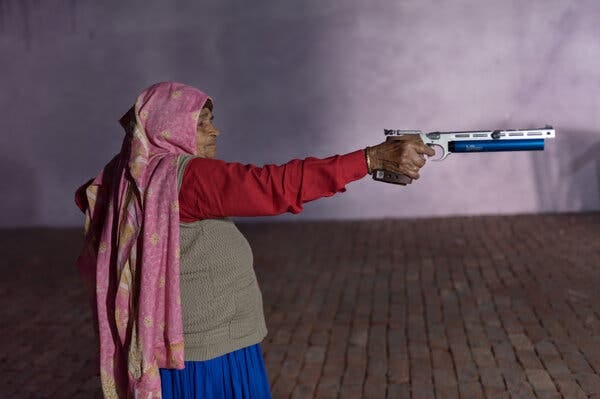Global Roundup: Femicide in Peru, Indonesian Girls Traumatized By Push to Wear Hijab, Intersex Advocates and Heroes, Migrant Women in Brazil, and Indian Woman Sharpshooter
Compiled by Samiha Hossain
A recent protest in Tacna, Peru, demanding justice for the killings of Judith Machaca and Noemí Escobar. Photograph: Mireya Cárdenas y Gianella Velásquez/Pan y Rosas via The Guardian
When parents from Tacna in southern Peru reported their missing daughter Judith Machaca, the police told them she was probably with a boyfriend and would show up soon. Machaca remained missing and the family began to protest at the police’s inaction by holding vigils outside the police station with placards reading “Where is Judith?” and “Police cover-up”. Two months later, Machaca’s body was found down a well on a farm belonging to the parents of a police officer. The body of 14-year-old Noemí Escobar was also found beside Machaca’s body.
A local judge released police officer Santiago Paco from custody while he was under investigation for killing both women. Paco posted a series of videos online confessing to the murders and saying he was part of a sex-trafficking ring operating from within the very police unit responsible for investigating human trafficking and disappearances. In addition, last month, an internal police investigation led to 30 police officers being moved to other units. Paco, however, remains in hiding.
138 femicides were reported by the authorities in Peru in 2020, but over 5,521 women were officially recorded as missing on a newly created registry of disappeared people – two-thirds are girls. These numbers are almost certainly an underestimation.
This case shows that even dealing with the authorities, as a woman, is putting yourself at risk. You don’t know if by reporting a disappearance, you could be reporting it to the trafficker himself. – Katherine Soto, founder of Facebook advocacy group Mujeres Desaparecidas (Missing Women)
Femicide has been a longstanding problem in Peru. The country has some of the highest rates of COVID-19 cases in Latin America with over 1.4 million cases – the resulting confinement and economic hardships have only exacerbated risks for women.
Though Peru’s current interim government boasts the largest-ever number of women heading key posts and public institutions, they will likely not have enough time to push for change in the presidential election taking place next month.
Again and again, we see that policing rarely helps women, but rather perpetuates, or at the very least ignores, gender-based violence. Where is the accountability? And where is the justice for these women and girls and their families? Advocates continue to demand for more, including dismantling patriarchy and ending the misogyny embedded within all systems of society.
------------------------------------------------------------------------------------------------------
Women walk past hijabs displayed for sale at the Tanah Abang textile market in Jakarta, Indonesia, March 16, 2021. Picture taken March 16, 2021. REUTERS/Ajeng Dinar Ulfiana
As a young woman, Ifa Hanifah Misbach was told her recently deceased father would not go to heaven because she refused to wear the hijab. Today, Misbach works as a psychologist in Indonesia where she counsels many Indonesian girls who have been ostracised, bullied and threatened with expulsion from school for also refusing to wear the hijab.
The impact of religious pressures, especially to wear the jilbab [Indonesia word for hijab], when you're young, makes it feel like you have no breathing room – Ifa Hanifah Misbach
Human rights researcher Andreas Harsono says that women and girls across the country face “intense and constant” pressure to wear the hijab. Human Rights Watch (HRW) describe this as an assault on basic rights to freedom of religion, expression and privacy.
A HRW report identified over 60 discriminatory local, provincial bylaws issued since 2001 to enforce female dress codes. Furthermore, a 2014 national government regulation has been widely interpreted as requiring all female Muslim students in the country to wear a hijab at school.
Indonesian state schools use a combination of psychological pressure, public humiliation, and sanctions to persuade girls to wear the hijab – HRW report
This issue received global attention last month with the case of a Christian schoolgirl in West Sumatra who was forced to wear the hijab. It resulted in a decree by the education and religious affairs ministry banning public schools from making religious attire mandatory. It is still unclear how strictly the decree will be enforced.
HRW found that the issue is not just in schools. For instance, many civil servants and lecturers have resigned from their jobs because of pressure to wear the hijab. Also, some women could not access government services because they chose not to veil.
Women should not have to adhere to their family’s, the state’s, culture’s or anyone’s standards of supposed modesty to have freedom and not experience discrimination. It is disheartening that so many young girls are made to feel guilt and shame for simply expressing their autonomy.
------------------------------------------------------------------------------------------------------
Intersex activists fighting prejudice and stigma, from left, River Gallo, Sean Saifa Wall and Pidgeon Pagonis. Photos: @rivergallo, @saifaemerges, @pidgeon/Instagram via South China Morning Post
Though people in the LGBTQI+ community have started to see more representation in mainstream media, intersex people are still subject to a lot of discrimination and stigma. An article in South China Morning Post highlights a few intersex activists that have been advocating for their community’s rights, as well as thriving in their career.
River Gallo is an award-winning model, activist and filmmaker. Their film Ponyboi premiered at the Tribeca Festival and won a GLAAD award. They have also worked on several intersex campaigns with organizations like NYC Pride and Facebook.
Small Luk is an intersex woman and renowned as the first Hong Kong native to publicly acknowledge their intersex status. After years of bullying and hardships, she founded Beyond the Boundary – Knowing and Concerns Intersex, an organization that educates the public, promotes intersex rights and advocates for an end to forced genital surgery and conversion therapy, which are common practices many intersex people are subject to.
Sean Saifa Wall is an American activist, speaker and advocate for intersex rights. Wall’s work has appeared in many well-known publications like the Quarts. Wall was also president of Interact Advocates for Intersex Youth for three years. Pidgeon Pagonis is another American intersex activist who is also an award-winning published writer and artist. Pagonis also advocates against non-consensual and “corrective” surgeries, which frequently entail severe genital mutilation.
These activists and artists around the world are breaking barriers and talking up space in creative ways. It is important that intersex people are more visible in mainstream media and have opportunities to tell their own stories. Feminist and other social justice movements must also fight for intersex issues such as ending the abuse and pathologization they face in the medical system.
------------------------------------------------------------------------------------------------------
Graffiti in São Paulo, Brazil - duncan c/Flickr. Creative Commons (by-nc) via Open Democracy
Open Democracy has recently written about nine different women to show the nuances of migrant women’s experiences in Brazil. One of those women, identified by the initials S.M., talks about suffering prejudice at home in Congo when she was studying and did not have any children. The prejudice was too strong, she says, that she decided to go through with motherhood. Still, she continued studying and working until political problems in Congo forced her to move.
I tried to fight to get back everything I had lost, but I haven’t gotten everything yet. In the beginning it was very difficult. You leave a country that speaks French and arrive in a place where the language is Portuguese.
Moving to Brazil meant she had to go from her previous career as a lawyer to becoming a maid. She talks about how Congo has a lot of sexist cultural practices and beliefs, which she sees less of in Brazil. However, things are tough for her in Brazil too, where she experiences racism as a Black woman.
It is a very racist country. For example, once I took the lift inside of a large company. I was going to speak at a seminar that was happening there. Then a person in the lift, told me ‘aren’t you leaving yet? Isn’t it time for you to leave now?’ For this person, as I am black, I am simply a cleaner, and if I wasn't cleaning it anymore I had to leave. But that day I was not a cleaning lady. I was actually a guest in that building. I was even a very important one.
Through reading the stories of migrant women in Brazil, it is clear that they face unique challenges in the country where they are often devalued and othered. It is powerful to see these women take control of the narrative and tell their stories.
------------------------------------------------------------------------------------------------------
Chandro Tomar practicing with an air pistol last month at the site of a shooting range she is building in her home in the Indian state of Uttar Pradesh.Credit...Smita Sharma for The New York Times
Chandro Tomar is an 89-year-old Indian woman who is believed to be the oldest professional sharpshooter in the world and a feminist icon in the country. She has won over 25 medals competing against men who have been shooting professionally for decades. She has also coached dozens of young women for over 20 years. The Bollywood movie Saandh Ki Ankh (Bull’s-Eye) is based on her life and that of her sister-in-law, Prakashi Tomar, a fellow competitor.
I wanted to encourage young girls everywhere to get into the sport and expand their horizons – Chandro Tomar
Tomar first picked up a gun at 65-years-old when she was accompanying her granddaughter to a range. She picked up the gun and hit bull’s-eye on her first try. This prompted her to start training, though she knew the rest of her family would not support it.
My husband and his brothers were very angry. They said, ‘What will people think? An old lady of your age going out to shoot guns? You should be looking after your grandchildren. – Chandro Tomar
However, she had the support of her children and was determined to keep training. Tomar also went door-to-door to encourage families to let their daughters learn the sport and won over many reluctant parents worried about their daughter’ safety. Now, she is widely known across the country and speaks on women’s empowerment. Also, the family is now building a shooting range for underprivileged children in their house to provide more people access to the expensive sport.
Tomar’s strength and achievements shows that women can be powerful at any age. She has paved the way for many young girls and encourages us all to try activities that have been traditionally male-dominated and considered too masculine for women and she has fought back against ageism and the ways it tries to constrain and make invisible older women.
------------------------------------------------------------------------------------------------------
Samiha Hossain (she/her) is a student at the University of Ottawa. She has experience working with survivors of sexual violence in her community, as well as conducting research on gender-based violence. A lot of her time is spent learning about and critically engaging with intersectional feminism, transformative justice and disability justice.
Samiha firmly believes in the power of connecting with people and listening to their stories to create solidarity and heal as a community. She refuses to let anyone thwart her imagination when it comes to envisioning a radically different future full of care webs, nurturance and collective liberation.


